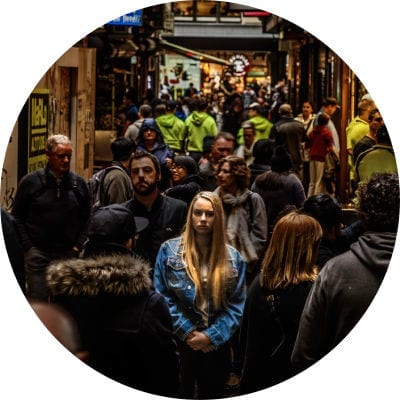Are we in danger of becoming numb, apathetic and emotionally detached from the reality of our world?
Terror attacks don’t make sense. Receiving news of their tragic occurrence can (rightfully, understandably) create such surges in emotion, such fiery outrage and angry disbelief, that the feelings are hard to hold. And because they’re hard to hold, we often choose not to. We move into our minds, to the rational, the logical, the sense-seeking spaces where we don’t have to feel the un-feel-able.
Our politicians and the media try to explain them to us: making links, finding motives and rationales, and underpinning heinous acts with political and cultural contexts. Essentially, they are creating stories to satisfy hungry and seeking minds. And of course, to give us all somebody to blame.
But for those of us who are rising into the truth that our co-created reality is really a holographic reflection of our inner worlds, these kinds of tragic events make this truth, this universal law, so hard to accept.
Does This Mean We Are All Somehow Responsible?
Did we all somehow create this?
Did I somehow create this?
That the answer to these questions may be: ‘Yes, within the tangled mess of our humanity, there is likely to be an essence of shared, collective responsibility’ is painful to bear. So painful, that I think many of us are scared to feel our way into the aching distress of what it really means. Instead, we stay safely inside our minds, inside the patterns of political and cultural contexts, where we don’t need to actually feel, or enter into the slow, personal process of unravelling our inner landscapes.
Can We Truly Be United?
We listen to our political leaders tell us that ‘We are united’ and that ‘We mustn’t let one person’s actions divide us’. But can we truly be united? Can we honestly express and jointly manifest one collective human experience that we all agree on, if we don’t allow ourselves to know ‘unity’ on an internal plane first?
How high can we really get?
How much light can we really hold?
How evolved can we each really become, on our spiritual quests through life, if we don’t also allow ourselves to drop down, equally far, into the dark emotional depths of what our species is really capable of? Because to be fully human is to unite all parts of ourselves, to embrace (or at the very least, to admit and accept) the full spectrum of our human emotions.
And this means to feel them. All of them.
Allowing Yourself to Feel Is to Be Human
But the increasing repetition and frequency of such terrible acts of violence means that we’re in real danger of becoming numb and dispassionate. When we unconsciously anaesthetise our reactions to horror, when shocking news fails to shock us anymore, when extreme violence can be reduced so quickly to statistical measure, it means that we’re allowing what’s truly wrong to wash over us as external and separate, without accepting that it belong to us too.
And whilst acts of terror must never be condoned or excused, we may need to accept that certain tools and guidance are necessary, to help us actively and healthily process the deep reactions that they trigger, so we’re not simply laying down more layers of pain and distress in our collective unconscious. So whatever our political leaders are urging us to be and do, we are still divided if we don’t accept, hold and start to unravel the horror, the darkness, and the deep, deep shadow within, as well as the light that we chase.
How To Safely Process Extreme Emotions
If we DO allow ourselves to truly feel, what then? What do we actually, safely, do with these extremes of emotion? Here is a quick, but really effective method to help you move through some of the difficult emotions that may be rising for you now, and to use the experience to decode the wisdom they hold for you.
- The first thing to do, is to sit with how you feel, to let the emotion be whole and real, to sink deeply into it and accept it fully as your inner world, in this moment. Don’t rush on and away, cover it over, hide or distract yourself. And crucially, don’t judge how you feel: your emotions are a natural and necessary response mechanism, and contain vital insights for you, about you! We are each a feedback loop of information, running directly to the Divine, so to interrupt this process is to stand in the way of your own sacred purpose.
- Feel into what your strongest emotion is. Is it anger? Fear? Sadness? Loneliness? Distrust? Let this process take as long as it needs to, but remember that it is vital to focus on how you feel and not what triggered the feeling – this is all about you.
- Now consider what the polar opposite emotion is, to the one you are feel So if you’re feeling anger, its opposite may be feeling free, unrestricted or powerful. If you are sad, its opposite may be joy, purpose or contentment. And feelings of loneliness may be opposed by feelings of belonging, love or intimacy, for example. This will be personal for you.
- Once you have narrowed your emotional focus into this linear spectrum, it will give you an idea of where your personal, emotional needs are: of where your own, specific emotional body is in need of healing, care and even soul retrieval. Because – and here’s the key – the opposing emotion to the one you initially felt, is what you are most likely to be lacking. This is nobody’s fault, and this is not a character flaw. This is your soul’s work.
The next steps are to commit to working on meeting these emotional needs. Continue to decode the messages your emotional body is offering, because THIS is where unity begins. This is how we will become truly unified – it all starts with YOU.
Comment below, or send me a message to share your experiences of navigating difficult emotions. Because by bringing them to the surface, we can allow others to heal too.
Photo by Mike Wilson and Christian Sterk.


